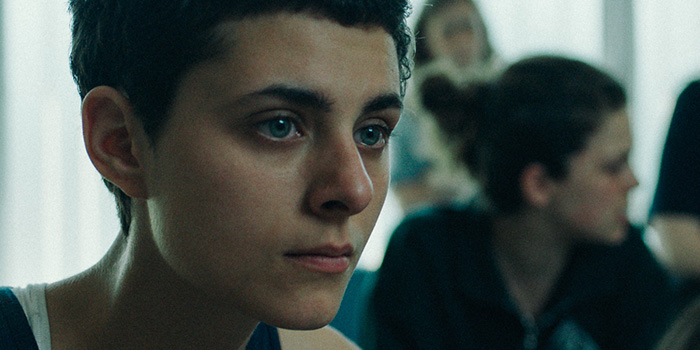A lot of people die during Sophocles’ Antigone. The death of Oedipus puts his sons Eteocles and Polynices on the throne, their deaths spark their titular sister to fight for the latter’s right to be buried, and her eventual suicide leads to more dead bodies as only a Greek tragedy could allow. While Canadian director Sophie Deraspe loosely adapts his play to tell her tale of North America’s immigration ills (through the specific lens of Montreal, Quebec), she leaves the killing behind. There’s good reason behind the decision, though, considering her film speaks about race, poverty, police brutality, and heartless judicial systems to reveal how there are often worse fates than death. Because what’s our reason for living if we’re no longer able to remember who we are?
That’s the point, though, right? That’s why people within the United States and Canada speak about “assimilation” as if those in power didn’t achieve their control as a result of Europe’s genocidal tendencies to destroy rather than learn under the blanket of Manifest Destiny. It’s not therefore about saving lives or granting refugees a means towards a better life. It’s about what you can bring to the table to benefit us. So when Antigone (Nahéma Ricci) relates a story about her older brother Polynice (Rawad El-Zein)—a young boy under the care of his grandmother (Rachida Oussaada’s Ménécée) like their other siblings Étéocle (Hakim Brahimi) and Ismène (Nour Belkhiria)—wanting nothing but a hug upon their arrival from Algeria, nobody providing one proves a scathing indictment.

It’s the same old song and dance minorities have combatted for centuries. They’re set-up to fail and then severely punished when they do. That neglect of a hug becomes a metaphor for how Quebec welcomed this family in with folded arms and skeptical looks. It didn’t matter that their parents were murdered just before they were all supposed to leave (Deraspe ignores Sophocles’ incest by leaving the children’s parents nameless symbols). It didn’t matter that they had nowhere else to go. Ménécée did what she could to raise them and Étéocle and Polynice took it upon themselves to help out once they were old enough to do so. Did the latter have an alternative to joining the Habibi gang? Not one that would supply what his family needed.
One could say Polynice sacrificed his soul for the family. He earned his criminal record so the rest could do better: Étéocle with sports, Ismène with a career, and Antigone with education. It was hardly a good choice and he was definitely having fun at the expense of innocents he helped corrupt (or worse), but he probably justified his actions nonetheless. So when Polynice’s latest arrest goes bad and leaves Étéocle with a bullet in his chest, who’s turn is it to step up in their place? Who but Antigone would be willing to staunchly defend someone like her brother by remembering the best parts of him to realize the sentence (deportation) didn’t fit the crime (a trumped up charge of assault on the officer who killed Étéocle)?

Deraspe writes Antigone as a Joan of Arc figure who watches her plan to serve as a decoy for Polynice’s escape implode and earn a spotlight that allows her to call out every single injustice protected by a government that sees human beings as binary statistics devoid of nuance. The police want to use her to set an example as retribution for losing Polynice, the court wants to absolve itself from ignoring the circumstances surrounding Étéocle’s death, and the girls in her detention center want to treat her like them: a self-centered inmate looking out for Number One. Anitgone refuses to play along, though. She instead turns the tables, increases media attention, and ultimately gets a community of like-minded and progressive teens her age to start a revolution.
Suddenly her face is graffitied in the streets a la Che Guevara thanks to her boyfriend Hémon (Antoine Desrochers)—the son of a local politician who feels a refusal to rock the boat is what he must do to protect his own family (Paul Doucet’s Christian). This young woman who just won a huge scholarship to use at a university of her choice has become a beacon of strength immigrants can rally behind and a catalyst for members of the establishment to open their eyes. The way in which her actions inspire the city to chastise the judge, cops, and prison employees is so empowering and successful that it can get to be too much. I half expected the film to end with Antigone as a lawmaker righting every wrong.

While Deraspe is intentionally going against the grain to turn Sophocles’ ancient tragedy into contemporary triumph, however, she doesn’t forget why that pain is so important to the message. Eventually there comes a point where all this attention must come to a head and force the opposition’s hand. The latter has dominated for too long and accrued too much weight to simply go away, though. Rather than admit defeat, they’ll offer compromise instead—one that repackages what they’ve always wanted into a palatable reward Antigone would be dumb to refuse. It’s the same choice countries supply every immigrant who comes ashore. You must trade your home for theirs, the family you’re given at birth for the security they’ll only provide in full under their self-serving terms.
Ricci is fantastic in the title role with a healthy mix of naiveté and ferocity. While her Antigone is the smartest of the bunch, she’s also the most pure. She sees her transgression as meaningful and thus can brave the assumed consequences. But that’s in a perfect world, which this is not. Instead of appreciating her sentiments, those she wishes to assuage with heartfelt empathy are numb to it. These are the people who turn blind eyes to high statistics of minorities being killed by police while falling in step with rhetoric calling those same victims “thugs.” To them a minority criminal is someone too lazy to succeed within the system that works for them. The system isn’t broken. They are. And we wonder how we got here.
Antigone screened at the Toronto International Film Festival.
